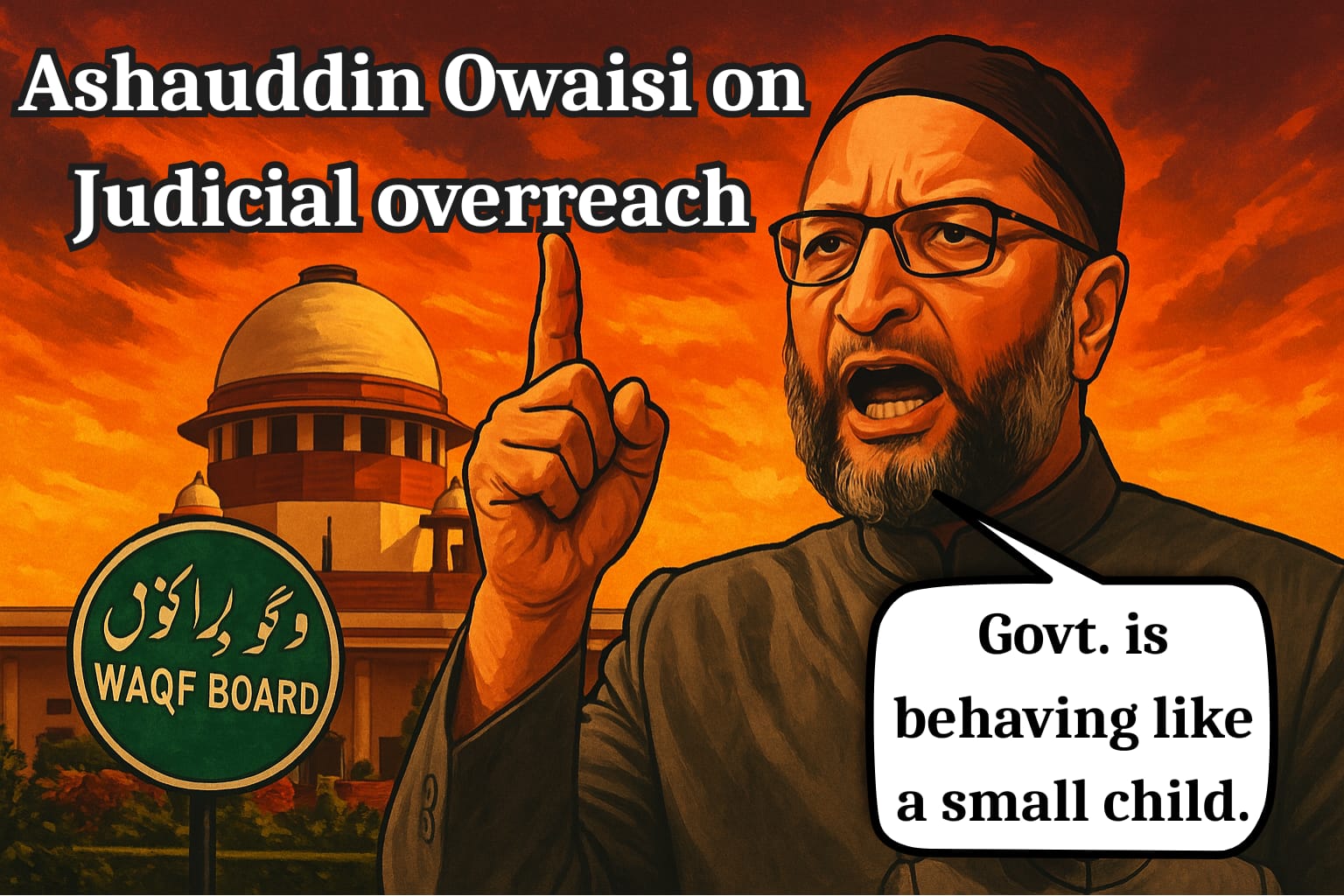The AIMIM chief, Asaduddin Owaisi, when questioned about the claims of judicial overreach subsequent to the Supreme Court’s decision to hear the petitions that challenged the Waqf (Amendment) Act, 2025, stated that the judiciary operates autonomously and has a responsibility to evaluate whether a law is in alignment with the Constitution. On 18th April 2025, Mr. Owaisi stressed that the Supreme Court must determine if a law interferes with freedom and fundamental rights or destabilizes the Constitution’s fundamental structure.
The chief of AIMIM, who happens to be one of the petitioners challenging the amended Waqf (Amendment) Act, 2025 in the Supreme Court, commented, “One has to accept… The government is behaving like a small child.
Oh, if I don’t get my toy, I’ll cry. That is not the case.” The petitioners contend that the law undermines several constitutional rights, including the right to equality and freedom of religion. However, Mr. Owaisi claimed that even if the law is meant to improve the regulation of Waqf properties, the Muslim community will be the ultimate loser.
The Issue
The Waqf (Amendment) Act, 2025, has led to substantial controversy in India, with the Muslim community opposing it vehemently. The administration of waqf properties—Islamic charitable endowments— is likely to be subject to considerable changes owing to the Waqf (Amendment) Act, 2025, including the exclusion of the ‘waqf by user’ provision, which enabled properties to be identified as waqf based on established religious or charitable use even if there was no formal documentation.
The Waqf (Amendment) Act, 2025 stresses that only individuals who have practiced Islam for at least five years can create a waqf, which essentially excludes new converts and non-Muslims from this religious practice. The Act, with these and other amendments, is being perceived as an interference with religious freedom and an effort to challenge the autonomy of Muslim institutions.
The Court’s Observations and Statements of Owaisi
Responding to petitions that challenged the constitutionality of the Waqf (Amendment) Act, 2025, the Supreme Court of India has asked critical questions about the practicalities and consequences of the new provisions. At the time of hearings, the Court queried the feasibility of demanding historical documentation for properties that have been in use for religious purposes for centuries, asking, “Are you asking for 3000-year-old sale deeds?”
This rhetorical question emphasizes the Court’s anxiety over the impracticality of such constraints and the potential for these provisions to unsettle established religious practices.
The Chief of AIMIM, Asaduddin Owaisi, a vocal critic of the Waqf (Amendment) Act, 2025, has greeted the Supreme Court’s inquiry. He overruled allegations of judicial overreach, emphasizing that the Court’s role is to make sure that laws do not disrupt the fundamental rights or the fundamental structure of the Constitution.
When queried about the constitutional dispute against the amended Waqf (Amendment) Act, 2025, Mr. Owaisi expressed concern that if the matter becomes a full-blown legal dispute, both the Waqf board and the Muslim community will be subject to considerable loss. He observed that with the introduction of a statute of limitations on Waqf properties, “basically the encroachers will become owners as of now.” Under Section 2, the properties that were earlier part of waqf will no more be included, which he claimed, “rewards the richest man in our country, who has built his grand palatial home, Khoja Koja orphanage.”
The Backdrop
The Waqf (Amendment) Act, 2025, was introduced by the Bharatiya Janata Party-led government with the stipulated aim of improving transparency and accountability in the supervision of waqf properties. Proponents contend that the reforms are necessary to stop corruption and make certain that waqf assets are used efficiently for the welfare of the community. However, the Waqf (Amendment) Act, 2025, has encountered stern opposition from various quarters, including the All India Muslim Personal Law Board (AIMPLB) and political groups such as the Indian Union Muslim League (IUML).
These groups argue that the Waqf (Amendment) Act, 2025 violates statutory provisions that guarantee religious independence and the right of groups to manage their own religious activities. The elimination of the ‘waqf by user’ provision, especially, has been denounced for ignoring the historical and cultural implication of properties that have served religious purposes for centuries without formal documentation.
The Implications of Waqf Amendment Law and Future Scenario
The controversy surrounding the Waqf (Amendment) Act, 2025, must be viewed from the broader context of India’s commitment to secularism and the protection of minority rights. Critics argue that the Act signifies a direct attack on the secular fabric of the country by enforcing state control over religious endowments and restraining the autonomy of minority communities. The insertion of non-Muslims in waqf boards, while shown as a move towards inclusivity, is considered by many as a way of diluting the community’s control over its religious affairs.
The requirement for documented proof of waqf properties threatens to dispossess communities of lands that have been in use for religious purposes for generations, simply due to the absence of formal records.
This situation leads to concerns about the possibility of communal tensions and the loss of trust between the state and minority communities. Under the 1995 Act, no clear rules could be cited regarding government land being declared as waqf. The new Bill makes clear that government-owned land, if erroneously recorded as waqf, will no longer be considered waqf. In case of such disputes, the District Collector, and not the waqf board, will have the final authority, and then the matter will be handled under the state revenue laws.
Conclusion
The Supreme Court’s examination of the Waqf (Amendment) Act, 2025, brings to the fore critical issues affecting religious freedom, minority rights, and the role of the state in religious affairs. The Court’s observations emphasize the necessity for a balanced approach that safeguards the independence of religious communities, while ensuring transparency and responsibility in the management of charitable endowments.
Asaduddin Owaisistated that the protests and legal battle will continue. His stance was that unless the Muslim community succeeds in getting this law declared unconstitutional, the government will continue to snatch properties, which will increase the suffering of the Muslims.
The States of Rajasthan, Gujarat, Haryana, Maharashtra, Assam, Uttarakhand, and Chhattisgarh have filed applications in support of the Waqf (Amendment) Act, 2025. The Central Government has submitted a caveat in which it requested the court to hear its side before issuing any interim orders. According to the government, this Bill will extend protection to lands from the arbitrary declaration of such properties as waqf properties.
About Author

Ananda Murthy JS is an English teacher in Hyderabad. His teaching experience spans more than 30 years, which includes his stint as an IGCSE teacher in the Maldives, lecturer in English for Intermediate students, writer and editor/language specialist, and IELTS, GRE and TOEFL trainer. He also provides English coaching to students appearing for CAT, IELTS, GRE and TOEFL privately in Hyderabad. Ananda has proficiency in editing SWOT analyses, market forecast and other reports, conducting Effective English sessions, and imparting training in Business English. He also write business blogs, key word dense articles and original articles on various topics.

